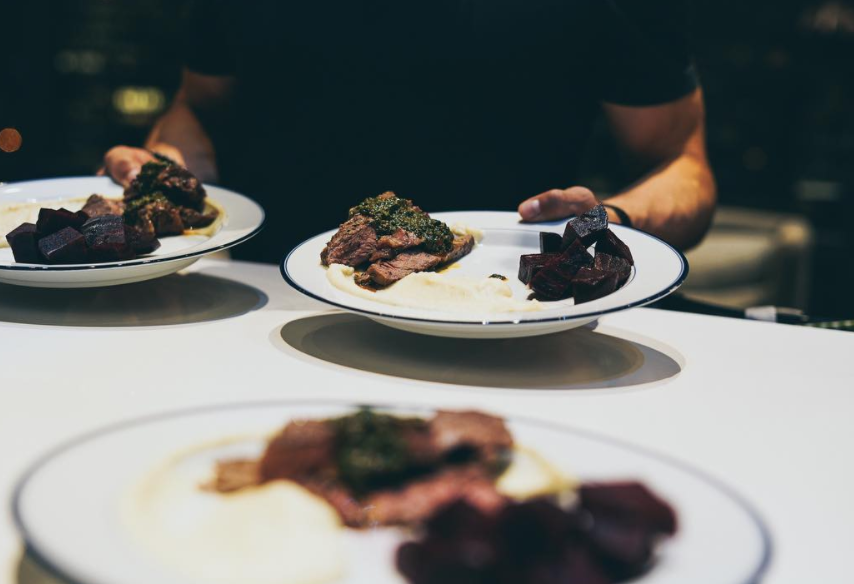Food & Social Pressure: Why Support Matters & How To Combat It

April 26, 2017
Think back to the last meeting you had at work where lunch was served. What food was put out? Our guess is likely pizza and salad…maybe sandwiches if you’re lucky.
If you happened to bring your lunch that day, did you still eat the pizza? Were you really going to be that guy (or girl) to sit there (seemingly “above” these unhealthy people) and not have a slice?
The number one issue we find with nutrition “mishaps” from clients or friends is always choices made under social pressure. “This was a one-off weekend. I had a birthday party. It was my friend’s wedding.” The list goes on and on for why you ate the cookie.
Guess what. Every single weekend (especially in the summer) is a one-off experience. Something is always going on, there is always a party to join, and bad decisions galore to indulge in. Somehow people are victimized by their environment, like the bar itself made you drink it.
Social Pressure is Strongest at Home, at Work, and Out With Friends.
If food is in the pantry or fridge, you’re going to eat it.
What about candy is sitting on your co-workers desk, you’ll grab that Reese’s Peanut Butter Cup every time you go by.
And a round of shots comes out, are you going to be the one to refuse yours?
Once someone goes for that piece of cake, it’s a cascade of group think that we’re not going to judge you for getting one too (which is how it should be), however, internally you write off the action of actually eating the food to “everyone else had a piece….”
Here is the simplest, most direct point we can make: You put the fork (or glass) to your mouth every single time you take a bite (or drink). Nobody “forces” you to do it. Hundreds of times a day, over and over again – you make the decision.
There is a time and place for purposefully enjoying these foods – I’m not proposing giving it up entirely at all – however, the time and place is not four times a week and every weekend.
Strategies on Combating Food & Social Pressures
Here are a few strategies to not be that guy (or girl)…
Create a 4-day Food Log for Wednesday, Thursday, Friday, and Saturday.
It’s really powerful to write down each bit of food you consume. It’s suddenly easy to realize why changes aren’t coming about when sugar is consumed multiple times per day, you’re getting nickel and dimed by happy hour beers, and your breakfast is a bagel with cream cheese. The 4-day food log gets you two weekdays and two weekend days, with Friday as the transition day.
By tracking your eating and drinking habits, you’ll start to notice where you’re weaker at dealing with social pressure and where there are holes in your decision making process.
Were you tired and ate whatever was convenient? Did you work late and not plan for that contingency?
Plan out your entire week’s worth of food, even the food you will be eating at a restaurant.
Discipline creates freedom, plain and simple. If you’re perfect all week long, and planned for a “re-feed” period on the weekend, you’ve done your job.
This game is about consistency, and to win you must plan. There are simply too many important decisions to make throughout the week, ranging from work to family to play – what you eat for breakfast, lunch, and dinner should not occupy that brain power.
Bring your lunch, and sit quietly through that work meeting. Don’t touch the pizza, and just state, “Hey I’m not actually that hungry today…I ate a big breakfast.” Then, quietly take a nice walk outside and eat your lunch a little bit later. You don’t have to flaunt your Superfood Kale Salad over the Meat-Lovers crew. Don’t be that guy (or girl).
Clean Out Your Pantry and Fridge.
If you did happen to indulge over the weekend, don’t leave the leftovers in the fridge. You’ll convince yourself you’re trying to save money, or that cold pizza tastes better, and it turns into Monday lunch. Then the whole start to the week is shot. Start off with a win, and pre-plan on Sunday. Get your food in order for the week, which includes subtracting the weekend festivities’ leftovers.
Get Your Spouse or Significant Other on Board with your Nutritional Aspirations.
It’s easier to cook healthy food together than it is to decide on two different places to eat. If you’re not supported at home, it’ll be the most difficult hurdle to overcome. Most couples operate on a similar frequency – you either both eat healthy remain active, or you don’t….together.
Create a schedule to workout together. Create time to grocery shop and cook together. Share in a delicious, (healthy) meal that you labored over…together. It’s an amazing transformation in social support, and cuts down on any judgement given or received.
The Last Line of Defense is Simple Avoidance of Food.
If you know you’ve got a problem with pastries, don’t walk past the bakery. If you can’t have one beer and relax, don’t put yourself around friends that will get you to drink ten. Avoiding the social pressure (that is inherently present) is another great strategy when you’re trying to make changes. Environmental factors are the strongest pressure cookers due to a perceived expectation for how you should feel and act. For instance, when was the last time you went to a concert, sober? Maybe it’s just a simple reminder from the past that causes you to do something, like drinking a Coca-Cola at the movies. That felt good and it’s forever ingrained in your memory as something you just do when sit down to watch a movie.
Understanding why you make certain decisions regarding food (and otherwise) is very important in making long-term changes to your health. Stop to reflect for a minute (after reviewing your food log) on where you can make changes to your social support.
People are either helping or hurting, and it’s time to get everyone playing for the same team. YOUR TEAM.
Leave a Reply Cancel reply
Tired of reading? check out our podcast.
Available on:
SPOTIFY
Apple podcasts
Listen now
The Best Day Ever Club
Join our exclusive newsletter to be the first to know about upcoming events, product recommendations and future retreats deals.
Thank you!
Your message has been sent. We'll contact you shortly
© 2021 Live Better LLC | Disclaimer | Diversity & Inclusion | Accessibility | Privacy Policy | Retreat Policy | Terms & Conditions | Website design by Isla Luna Studio



